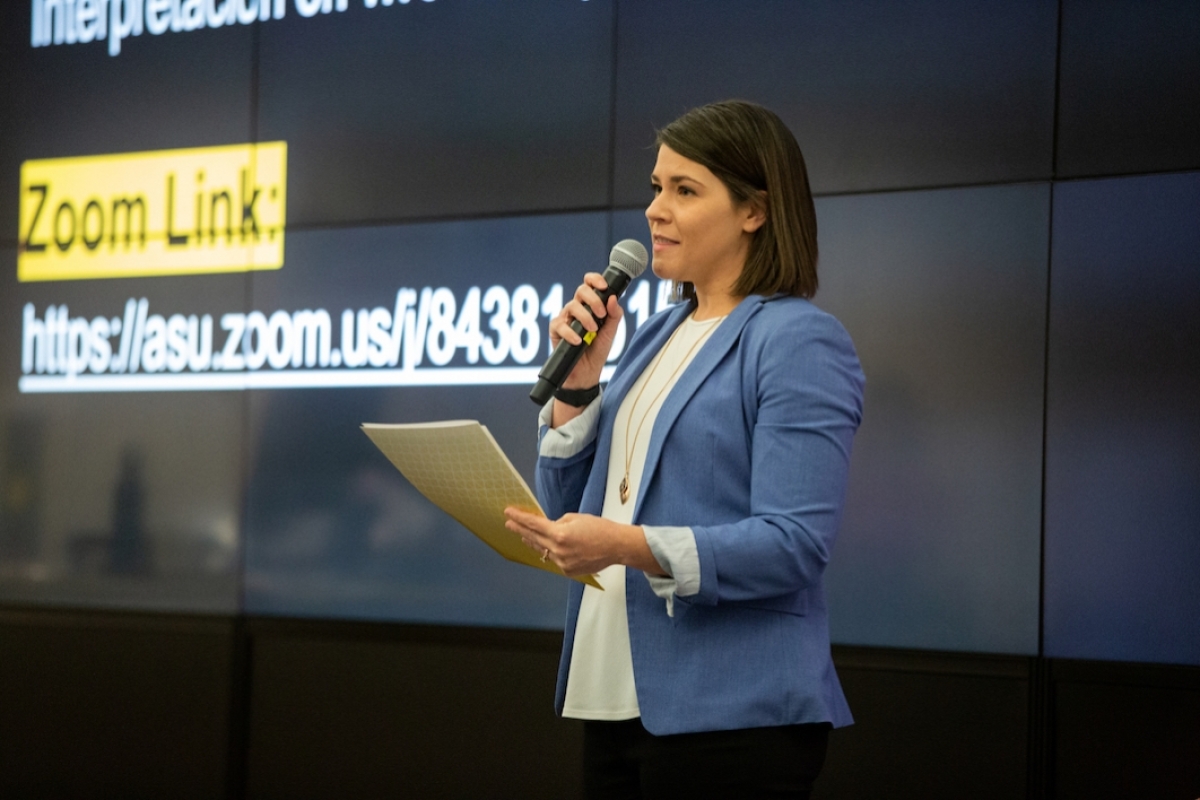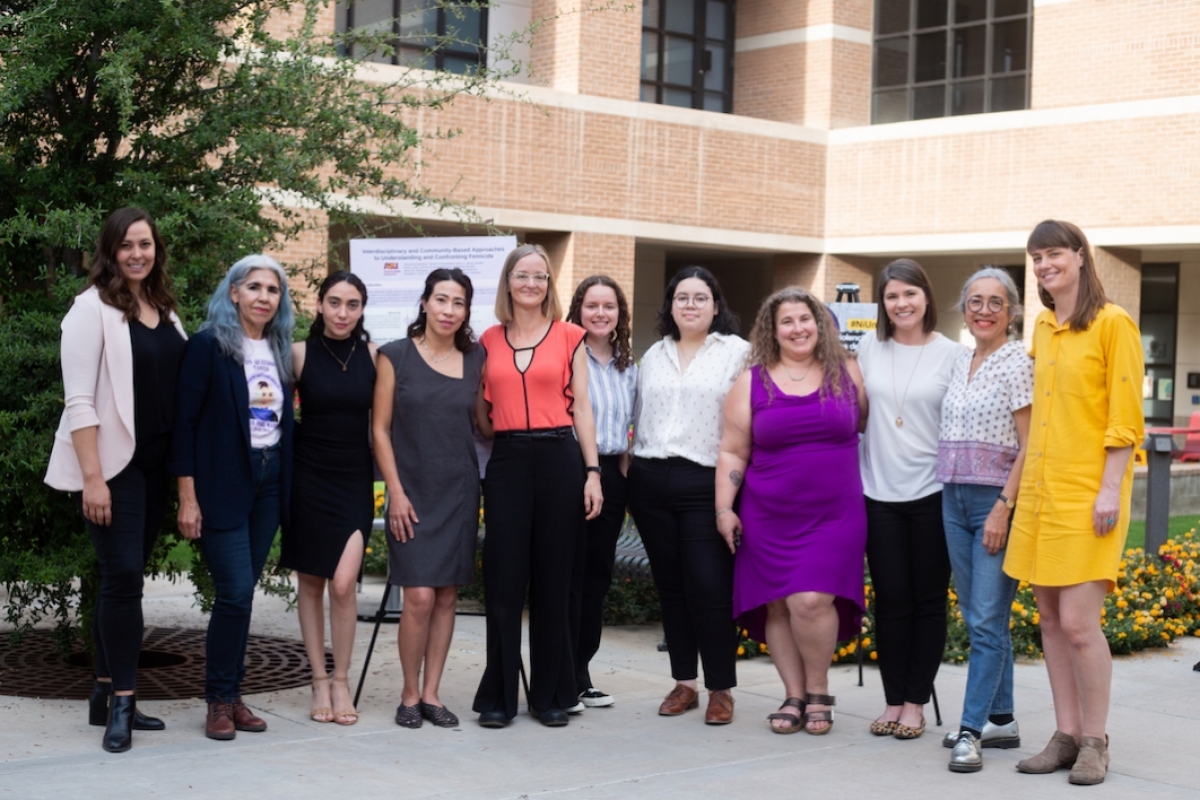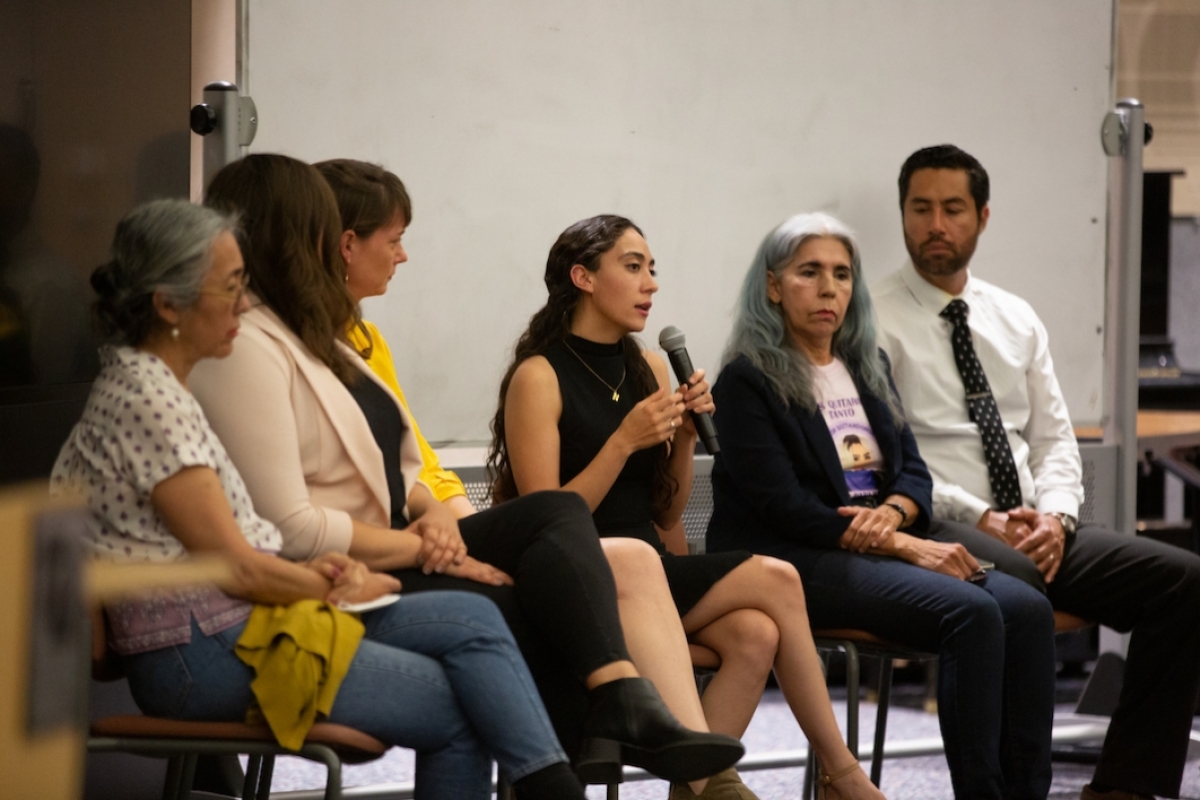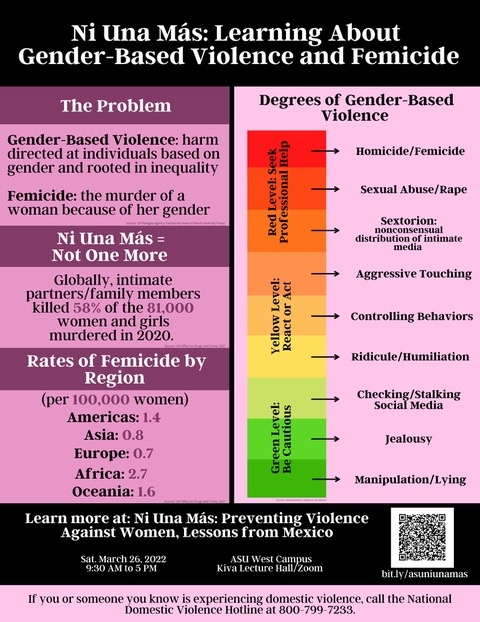ASU event advocates for the end of gender-based violence in Mexico
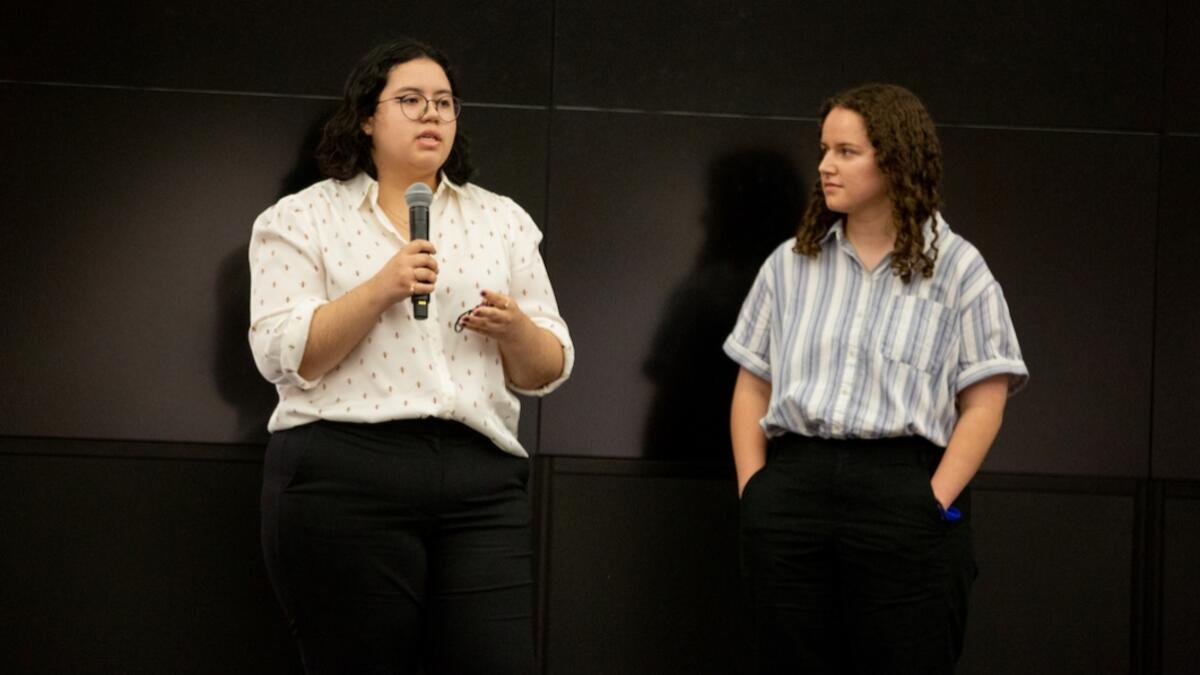
Emily Lopez (left) speaks to guests at the event about her research with Samantha Barbosa (right).
When Arizona State University student Emily Lopez took a course on the history of genocide, she learned about the atrocity of femicide, the gender-based killing of women. What she learned moved her to research femicide in Mexico as part of her undergraduate honors thesis.
On March 26, a symposium inspired by Lopez's research, "#NiUnaMás: Preventing Violence Against Women, Lessons from Mexico,” was hosted at ASU's West campus by the Global Human Rights Hub, along with several university and community partners.
At the event, activists, journalists, professors, lawyers and community members shared their research on gender-based violence in Mexico through panel discussions in order to explore interdisciplinary approaches to combating the femicide epidemic.
The timing of the symposium was especially prescient, with the Global Human Rights Hub set to roll out a series of events during Genocide Awareness Week, April 4 to April 9.
“I wanted to contribute what I could to the conversation,” said Lopez, a double major in history and English. “And when this came up, it was a great way to contribute.”
The symposium came about from conversations Lopez had with ASU faculty as part of the New College Undergraduate Inquiry and Research Experiences program, or NCUIRE, which allows undergraduate students the opportunity to participate in research or creative projects with faculty as mentors.
RELATED: NCUIRE gives undergrads opportunity to conduct research on West campus
The program also encourages students to collaborate with each other, so when Samantha Barbosa and Alexis Rodriguez expressed interest in her work, Lopez welcomed their contributions with open arms. Together, they worked to create educational resources, including an infographic and research poster on femicide, and helped in the organization of the event itself.
Kendall Funk, the Global Human Rights Hub’s director of public engagement and an assistant professor of politcal science, helped coordinate the students' research into the large-scale educational symposium. Her expertise in women’s representation in Latin America made Funk a great asset to the team.
“I think it's a really interesting place where historically, there have been more of these traditional norms, but now if you look at rankings of women legislators around the globe, several Latin American countries consistently rank among the top performers in the world on women's representation,” Funk said.
#NiUnaMas, which translates to "not one more," is a term coined by activists on social media calling for the end of gender-based violence in Mexico and other Latin American countries. Their work has not gone unnoticed.
In 2007, the Mexican government passed legislation titled "Ley General De Acceso De Las Mujeres A Una Vida Libre de Violencia," or "A General Law on Access to a Life Free of Violence," which characterized femicide as a crime separate from homicide.
Femicide “comes out of a deeply rooted patriarchal system,” Lopez said.
“Essentially what (the legislation) asks for is for institutions to work together in Mexico to prevent and eradicate femicide,” she added. “It says that women are valuable members of our society, women are equal members of our society, so we need to do what we can to protect them. It says we recognize femicide and we should work on all levels — state, district, federal — to address femicide.”
However, Lopez said it is important to establish a clear distinction between homicide and femicide in order to ensure that the issue is properly addressed.
“It is a little vague, which is why it hasn't been very effective, but it was the steppingstone for calling out femicide and recognizing femicide in Mexico. Whereas previously it had not been recognized in any sort of penal codes or anything, and now it is,” Lopez said.
ASU undergrads Emily Lopez, Samantha Barbosa and Alexis Rodriguez collaborated on a research poster they presented at the "#NiUnaMás: Preventing Violence Against Women, Lessons from Mexico" symposium on March 26.
These and other insights gleaned throughout their participation in the NCUIRE program were shared by Lopez, Barbosa and Rodriguez at the symposium. Barbosa said NCUIRE allowed them the autonomy to explore their own specific interests while offering the support of ASU faculty.
“I realized that there are so many connections to be made, and they want your learning to be something that you're passionate about,” Barbosa said. “This experience has transformed how I see ASU, especially the community aspect, the fact that so much of this event was us engaging with our community.”
For their research, Barbosa focused on art and journalism, Rodriguez focused on policy and law, and Lopez focused on academics.
“It was a great way to learn even more about femicide, and specific focuses in research, community advocacy, legislation and art,” Lopez said. “It rounded out our understanding of femicide, and it was really fun to get to work with them."
Lopez said the program helped her “to become a better researcher and to become a better writer.”
And through their collaboration with the Global Human Rights Hub, the students were able to gain expsoure to another valuable resource at the university. The hub focuses its research in four working groups: gender, which Funk co-leads, international law, migration and trafficking. As the hub continues to grow, it hopes to expand into new areas of research.
“Within the hub, we have political scientists, anthropologists, sociologists and others,” Funk said. “That is really unique in academia to have such cross-disciplinary and interdisciplinary discussions and collaborations happening on a regular basis.”
Funk said the gender group meets monthly to provide a supportive environment for feedback on working projects or papers before the research is shared with the public. The groups are open to both undergraduate and graduate students, as well as faculty.
“It can really serve as innovative grounds for people to create new ideas and see how scholars from different disciplines are approaching the same issue,” Funk said.
The hub also has a fellowship program that brings in graduate students from a variety of disciplines at ASU to collaborate with a mentor to develop and publish research. Applications for the program open at the beginning of the fall semester.
The hub hopes to publish a series of op-eds in the Washington Post's Monkey Cage, a political science blog that aims to share research with the public.
“My hope is just raising more awareness and recognition of everyday violence that we've become so accustomed to accepting, and starting to end that violence before it has a chance to escalate,” Funk said.
More Arts, humanities and education

ASU alum's humanities background led to fulfilling job with the governor's office
As a student, Arizona State University alumna Sambo Dul was a triple major in Spanish, political science and economics. After…

ASU English professor directs new Native play 'Antíkoni'
Over the last three years, Madeline Sayet toured the United States to tell her story in the autobiographical solo-…

ASU student finds connection to his family's history in dance archives
First-year graduate student Garrett Keeto was visiting the Cross-Cultural Dance Resources Collections at Arizona State University…
